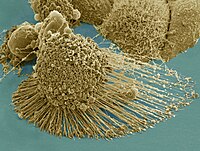
Photo from wikipedia
Atypical teratoid/rhabdoid tumor (AT/RT) is a rare intracranial tumor occurring predominantly in young children. The prognosis is poor, and no effective treatment is currently available. To develop novel effective therapies,… Click to show full abstract
Atypical teratoid/rhabdoid tumor (AT/RT) is a rare intracranial tumor occurring predominantly in young children. The prognosis is poor, and no effective treatment is currently available. To develop novel effective therapies, there is a need for experimental models for AT/RT. In this research, we established a cell line from a patient’s AT/RT tissue (designated ATRT_OCGH) and performed drug screening using 164 FDA-approved anti-cancer agents, to identify candidates for therapeutic options. We found that bortezomib, a proteasome inhibitor, was among the agents for which the cell line showed high sensitivity, along with tyrosine kinase inhibitors, topoisomerase inhibitors, and histone deacetylase inhibitors, which are known to exert anti-AT/RT effects. Concomitant use of panobinostat potentiated the inhibitory effect of bortezomib on AT/RT cell proliferation. Our findings may provide a rationale for considering combination therapy of panobinostat and bortezomib for treatment of AT/RT.
Journal Title: Human Cell
Year Published: 2020
Link to full text (if available)
Share on Social Media: Sign Up to like & get
recommendations!